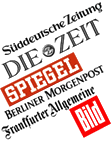The Nice Summit took place in December last year. This week, the German press reported on the ratification of the agreement. The Nice Summit was important in the eyes of many Central Eastern Europeans, because it was here that the necessary internal reforms of the EU were to have been made in preparation for expansion. Some among the candidates hoped that a firm date might be set for their entry into the European Union.
Political earthquakes
Forget about Washington&—there could be a political earthquake within the European Union. While the end result of the Nice Summit remains evasive to this day, the French President of the European Parliament said, as reported in Der Tagesspiegel on 27 February, that were the Treaty not ratified it would cause a "political earthquake." Fontaine also said that the text of the treaty was inadequate, but that one had to "turn toward to the future and the following conference in 2004."
The show must go on
The Tageszeitung ran two opposing articles&—one in which German Green Party member Christian Sterzing said that those who vote against the agreement are unwittingly playing the role of opponents to the polity of the EU: "Every demand not to ratify the new agreement and to rework the treaty not only sends the wrong signals to our neighbours but endangers the entire plan for enlargement;" the other article, by Austrian Green Party member Johannes Voggenhuber, said that one could only agree with this treaty if the European Parliament were given more power.
The Weimar (not Bermuda) triangle
The enlargement of the European Union was thus once again the primary thread inthe coverage by German press of events in Central Eastern Europe. Die Welt reported on 28 February that the governments of France, Poland and Germany met in Neustadt in order to discuss EU enlargement and European security. The headline of the article read "The Weimar Triangle should Encourage EU Enlargement." Among other things, the three nations discussed the proposed waiting period before the new countries could fully enter the workforce in the European Union.
Finally, the Tagesspiegel also, discussed barriers in the European workforce in an article entitled "Enlargement to the East." The author says that the suggestion of German Chancellor Gerhard Schröder that there be a waiting period of a number of years before the new members of the European Union could enter the workforce within Germany has found favour among many.
No influx of new European members wanted
Economists at the German Institute for Economic Research (Deutsche Institute für Wirtschaftsforschung) estimate that in the coming years Germany will receive 220,000 immigrants from Eastern Europe annually. And while some, like EU commissioner for work and social affairs Anna Diamantopoulou, say that "the European workforce should be readily open to everyone," (Tagesspiegel, 1 March), many Germans fear that very prospect.
Plus ça change...
Both Die Tageszeitung and Die Welt reported on 27 and 28 February respectively on the elections in Moldova. Die Tageszeitung wrote, "Communists clean up in Moldova." The article explains the results: the former centre-right coalition of Dumitru Braghiş received only 14.4 percent of the vote, while the communists got 50.2. The article goes on to say that the Communists promised in the election campaign to secure Russian as the second official language, to raise salaries and to extend controls over the economy. Shocking news for any communist party&—imagine extending state control over a people, encouraging the use of Russian... The more things change, the more they remain the same.
The tone taken in Die Welt was less conciliatory toward the election results. The headline reads "Moldova's Communists wanted to repeat History." The first line of the story&—"The ice age returns to Moldova." The Leader of the Communist Party in Moldova, Wladimir Woronin, said (as quoted in Die Welt) that he wants to "reinstate the relations [with Russia, and Belarus] the country had before the Putsch of 1991." The article in Die Welt is more severe in judging the election results than that in Die Tageszeitung.
Ukraine admits it was indeed Gongadze
It would appear that Die Tageszeitung alone reported on the renewed protests in Ukraine against President Leonid Kutschma. They ran one short article on 27 and another more analytical on 28 February. There were renewed protests against President Kutchma on Sunday shortly before the Ukrainian government finally confirmed through DNA tests that the headless corpse found in the woods belonged to that of murdered journalist Heorhiy Gongadze.
Odds and ends...
Slovenia was featured in an article in Der Tagesspiegel after German Foreign Minister Joschka Fischer visited the former Yugoslavia republic. Fischer praised Slovenia for its role as a "stabilizing factor in Southeastern Europe." While relations between Slovenia and Germany are good, Fischer stressed at this meeting that the waiting period before absolute freedom of movement into the workforce of the European Union would be imposed on Slovenia as well. In turn, a representative of the Slovenian government said that this was an "extremely uncomfortable propositiong for Slovenia" because the country poses little threat to the stability of the workforce in the European Union at large.
Another article that appeared in Der Tagesspiegel on the 2 March (called "Russia's Foreign Policy,") discussed how Russia is turning to the east to gain power and influence—most specifically in North and South Korea. Last week, Russia proposed a pan-European missile defence system—the Russians have not turned their heads completely to the east at all.
Andrea Mrozek, 2 March 2001
Moving on:
- Archive of German press reviews
- Browse through the CER eBookstore for electronic books
- Buy English-language books on Central and Eastern Europe through CER
- Return to CER front page
Sources:
Die Zeit
Frankfurter Allgemeine Zeitung
Die Süddeutsche Zeitung
Die Tageszeitung
Der Tagesspiegel




